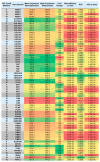Gene Expression Indicates Altered Immune Modulation and Signaling Pathway Activation in Ovarian Cancer Patients Resistant to Topotecan
- PMID: 31195594
- PMCID: PMC6600443
- DOI: 10.3390/ijms20112750
Gene Expression Indicates Altered Immune Modulation and Signaling Pathway Activation in Ovarian Cancer Patients Resistant to Topotecan
Abstract
Epithelial ovarian cancer (EOC) is one of the deadliest gynecological malignancies. Topotecan remains an essential tool in second-line therapy; even so, most patients develop resistance within a short period of time. We aimed to identify biomarkers of topotecan resistance by using gene expression signatures derived from patient specimens at surgery and available subsequent responses to therapy. Gene expression was collected for 1436 patients and 10,103 genes. Based on disease progression, patients were categorized as responders/nonresponders depending on their progression free survival (PFS) state at 9, 12, 15 and 18 months after surgery. For each gene, the median expression was compared between responders and nonresponders for two treatment regimens (chemotherapy including/excluding topotecan) with Mann-Whitney U test at each of the four different PFS cutoffs. Statistical significance was accepted in the case of p < 0.05 with a fold change (FC) ≥ 1.44. Four genes (EPB41L2, HLA-DQB1, LTF and SFRP1) were consistently overexpressed across multiple PFS cutoff times in initial tumor samples of patients with disease progression following topotecan treatment. A common theme linked to topotecan resistance was altered immune modulation. Genes associated with disease progression after systemic chemotherapy emphasize the role of the initial organization of the tumor microenvironment in therapy resistance. Our results uncover biomarkers with potential utility for patient stratification.
Keywords: biomarker; gene arrays; gene expression; ovarian carcinoma; resistance; survival; tumor microenvironment.
Conflict of interest statement
The authors declare no conflicts of interest.
Figures





Similar articles
-
Analysis of acquired resistance to metronomic oral topotecan chemotherapy plus pazopanib after prolonged preclinical potent responsiveness in advanced ovarian cancer.Angiogenesis. 2014 Jul;17(3):661-73. doi: 10.1007/s10456-014-9422-9. Epub 2014 Feb 26. Angiogenesis. 2014. PMID: 24569856 Free PMC article.
-
New and Old Genes Associated with Topotecan Resistance Development in Ovarian Cancer Cell Lines.Anticancer Res. 2017 Apr;37(4):1625-1636. doi: 10.21873/anticanres.11493. Anticancer Res. 2017. PMID: 28373423
-
Topotecan compared with no therapy after response to surgery and carboplatin/paclitaxel in patients with ovarian cancer: Multicenter Italian Trials in Ovarian Cancer (MITO-1) randomized study.J Clin Oncol. 2004 Jul 1;22(13):2635-42. doi: 10.1200/JCO.2004.09.088. J Clin Oncol. 2004. PMID: 15226331 Clinical Trial.
-
Role of Extracellular Vesicles in Epithelial Ovarian Cancer: A Systematic Review.Int J Mol Sci. 2020 Nov 19;21(22):8762. doi: 10.3390/ijms21228762. Int J Mol Sci. 2020. PMID: 33228245 Free PMC article.
-
Multi-omics in high-grade serous ovarian cancer: Biomarkers from genome to the immunome.Am J Reprod Immunol. 2018 Aug;80(2):e12975. doi: 10.1111/aji.12975. Epub 2018 May 21. Am J Reprod Immunol. 2018. PMID: 29781548 Review.
Cited by
-
Proteomic alterations in ovarian cancer-Predicting residual disease status using artificial intelligence and SHAP-based biomarker interpretation.Front Med (Lausanne). 2025 Jul 23;12:1562558. doi: 10.3389/fmed.2025.1562558. eCollection 2025. Front Med (Lausanne). 2025. PMID: 40771481 Free PMC article.
-
Specific Blood RNA Profiles in Individuals with Acute Spinal Cord Injury as Compared with Trauma Controls.Oxid Med Cell Longev. 2023 Jan 12;2023:1485135. doi: 10.1155/2023/1485135. eCollection 2023. Oxid Med Cell Longev. 2023. PMID: 36686379 Free PMC article.
-
Prognostic and immunological characteristics of CDK1 in lung adenocarcinoma: A systematic analysis.Front Oncol. 2023 Mar 6;13:1128443. doi: 10.3389/fonc.2023.1128443. eCollection 2023. Front Oncol. 2023. PMID: 36950551 Free PMC article.
-
Wnt antagonist as therapeutic targets in ovarian cancer.Int J Biochem Cell Biol. 2022 Apr;145:106191. doi: 10.1016/j.biocel.2022.106191. Epub 2022 Mar 7. Int J Biochem Cell Biol. 2022. PMID: 35272015 Free PMC article. Review.
-
An unappreciated cell survival-independent role for BAFF initiating chronic lymphocytic leukemia.Front Immunol. 2024 Feb 26;15:1345515. doi: 10.3389/fimmu.2024.1345515. eCollection 2024. Front Immunol. 2024. PMID: 38469292 Free PMC article.
References
MeSH terms
Substances
Grants and funding
LinkOut - more resources
Full Text Sources
Medical
Research Materials
Miscellaneous

